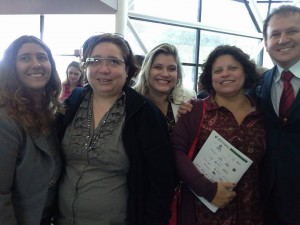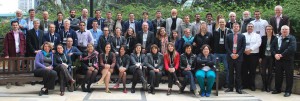
As part of our celebrations for Open Access Week, we asked Renata Aquino Ribeiro (second from left), doctor in educational technology in Brazil, and author of the blog Pesquisa Educação (Research in Education) to give us her perspective on open access.
Tell us about yourself
As a researcher in education and technology, I have learned the importance of open access and I plan to continue advocating it. I’m part of a research group in Federal University of Ceará – UFC – Fortaleza, Brazil doing a project with biblographic management open tools for scientific publications (Zotero).
I believe in the power of scientific social networks and I encourage educators to use them. I teach courses about them at scientific events, such as in the international conference of Brazilian Association for Distance Learning – ABED and I also collaborate in discussions in edtech communities such as Praxis.
Discussions about internet governance and online scientific research challenges are major themes of investigation for me right now. I’ve sent a contribution and participated in the NETMundial and the School of Internet Governance EGI.br organized by the Steering Committee for the Internet CGI.br in Brazil.
How did you find out about open access? Do you think there’s much awareness of it amongst students?
I found out first about open access as early as when I was an undergraduate student. By then, paywalls were already a barrier to research, especially outside Latin America, but I decided at that time that I would always strive to find international research despite such difficulties. When I started teaching, my undergraduate students couldn’t understand the existence of barriers to scientific research such as paywalls.
It was only as a PhD candidate and part of postgraduate research group that I, my colleagues, and our students understood that it is possible to make a choice to support open access and open educational resources (OERs) rather than simply suffering the restraints of paywalls.
What impact would it have on you if subscriptions you currently use to access research became unavailable to you?
The subscription model is a context we’re trapped in.There is a false idea that open access cannot be implemented due to costs and the logistics of building such a model. However, it is the subscription model that is currently becoming impractical. Brazil is a large country and communicating well is key to scientific success here. Articles behind subscription paywalls aren’t usually read and they become ignored.
On the other hand, the access to international articles, through subscriptions, is vital for enhancing the research carried out here and it would be a tragedy if they became unavailable. Research should be open to the public and always available.
What benefits do you think there are to publishing open access? And do you think there are any barriers?

My career benefits greatly from publishing open access while my articles behind paywalls have had an impact lower than expected. My students and colleagues want to have access to the articles and are discouraged by paywalls.
It took me a while to understand that I could choose publications within the open access model. I wish I had learned about this earlier and now I try to inform my students and colleagues about open access publishing and how they should use it. Information is the only barrier between a researcher and publishing open access.
What do you think publishers (and others) should be doing to raise awareness of open access?
It is vital to understand that open access should be preferable to publishers, researchers and governments. Economical, political and intellectual reasons can be enumerated to explain why. But the most important issue is: knowledge should be easily accessible by everyone and openly shared.
I do believe public policies play an important role in raising awareness for open access and there should be a global policy rewarding researchers who choose to share their findings in open access publications. Science depends on it, and governments should face the challenge of encouraging it.
*This post has quotes from Renata Aquino Ribeiro’s profile at OpenCon2014.org. Renata has a blog about her courses on education and mobile technology, and has also written an international article on open access about it.
One Comment